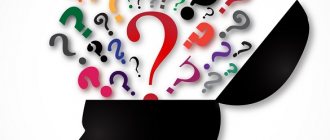Updated: 05/26/2021 11:34:28
Expert: Belozertseva Evgenia Aleksandrovna
“You can pretend to be knowledgeable. And you can pretend to be smart too. You can’t pretend to be intelligent.” D.S. Likhachev
What do you mean when you talk about intelligence? Some define this quality as cultural upbringing and impeccable manners, others consider it a merit of being well-read and educated. Still others think that intelligence is a set of personal qualities that determine creative inclinations. From the point of view of sociology and psychology, this concept includes all the points of view described above and a little more (tolerance, empathy, craving for art, etc.).
Outstanding Russian psychotherapist M.E. Litvak analyzed the concept of “intelligent person.” Having examined the definition from the point of view of different fields of activity, he found an undoubted similarity with the definition of “self-actualized personality” put forward by Abraham Maslow (the founder of the humanistic trend in psychology). What set of qualities is endowed with a self-actualized (intelligent) personality:
- Sober, adequate thinking
. A person has realistic thinking and calmly accepts reality. He is not characterized by neurotic spectrum disorders.
- Intellectuals accept themselves and other people unconditionally.
There are no high or low expectations. They recognize the very value of themselves and others, and understand that everyone deserves to be accepted.
- Self-actualized individuals demonstrate natural, unaffected behavior.
There is no reason for them to try to look or act differently. Their key quality is self-honesty.
- Intelligent people are focused on a specific task
, which is burning, and not on oneself. Egocentrism is a foreign concept to them.
- Developed internal dialogue
d. Such people know how to find company within themselves for small talk, and are absolutely independent of their environment. Their own company brings them satisfaction because they have enough knowledge and ideas to discuss with themselves.
- Objectivity
- a striking feature of intellectuals. When assessing phenomena, things, events, they rely only on realistic facts, and not on subjective opinion. Therefore, the expression of their point of view is always interesting, restrained, full of interesting facts and observations.
- Self-actualized individuals operate not only with existing knowledge, they create it. Creativity, creativity and the need for contemplation make them generate ideas, creating stunning works of art and science.
- They know how to make witty jokes
. Their sense of humor does not contain criticism or infringement of the rights and dignity of other people. That’s why informal dialogue with an intelligent person is so pleasant and easy.
The demonstrated set of qualities seems an unattainable ideal. By the way, Abraham Maslow thought exactly so. He believed that only 1% of people can be fully called self-actualized individuals. Being an intelligent person does not mean being a perfect example of humanity. And in this article we will identify ways that will help everyone who wants to become more intelligent.
Who is an intellectual
Intelligence is not only high intelligence and brilliant education, it is also good manners, the ability to live in harmony with oneself and others, in accordance with one’s conscience, it is an active civic position, the concept of honor and dignity, the desire for truth.
In order to educate yourself and not stand below the level of the environment in which you find yourself, it is not enough to read only Pickwick and memorize a monologue from Faust. <…> Here you need continuous day and night work, eternal reading, studying, will... Every hour is precious here...
A. P. Chekhov
letter to brother Nikolai, 1886
And while someone quietly laughs at intellectuals because of their emphasized correctness and intellectuality, all over the world they are talking about the Russian intelligentsia as a cultural phenomenon, a phenomenon that originated in the Russian Empire and marked the beginning of the identification of a special, albeit very small, stratum of society throughout the rest of the world.
A nation that does not value intelligence is doomed to destruction. The history of the Russian intelligentsia is the history of Russian thought.
D. S. Likhachev
"The Book of Worries"
A.P. Chekhov and D.S. Likhachev are considered to be true Russian intellectuals. In a letter to his brother Nikolai, young Chekhov cited a kind of code of an intelligent person, on which the following advice is largely based.
What is intelligence
An intelligent person demonstrates his personal dignity in the professional and social sphere, striving to achieve better results and bring benefit to humanity through his activities to the extent that his chosen specialization allows. The concept of decency and honor is inseparable from intelligence and is manifested in the adequacy of actions, orientation towards one’s own meanings and values, non-susceptibility to external influence, correctness in relation to others, regardless of their position and behavior.
The intelligentsia is a special community of people engaged in mental work, striving to accumulate and systematize existing knowledge, as well as its further transfer and the discovery of new experience. A person’s desire to submit his own intellectual and sensory experience to reflexive analysis, the ability to notice details and patterns, strive for knowledge and never-ending curiosity can be characterized as internal intelligence. This also includes the presence of high internal values in maintaining the moral and ethical qualities and manifestations of humanity.
Inner intelligence is impossible without a broad outlook and great internal experience, as well as constant openness to new things. There is no place for dictatorship, that in the behavior of other people, in their preferences, traditions and beliefs are not condemned. Before making a conclusion about someone, an intelligent person will try to understand as much as possible the person’s motivation in a particular action, and if the action turns out to be beyond the limits of what is morally acceptable, then it is the action, not the person, that will be subject to censure.
The concept of intelligence appeared to characterize a certain group of people (intelligentsia) engaged in mental work, when the number of such people increased compared to ancient times, where physical work predominated. When activities that did not bring visible and quick results began to actively shape society and the paths of human development, certain markers appeared for classifying a person as an intelligentsia. Just intellectual work is not enough; it is necessary that the activity corresponds to the maintenance of cultural values and contributes to the development of both an individual person (which is clearly represented by the activities of teachers) and large human associations (which concerns the establishment of legislative state law).
In many societies, the concept of the intelligentsia is replaced by the concept of intellectuals who are engaged in the same type of activity, but do not pretend to bring new good meaning to the masses. These people are characterized by greater modesty, less desire to rank people by class and merit, and also give everyone their own priorities based on their judgments. At the same time, they continue to develop themselves and develop the surrounding space with their own professional contribution.
And there are quite a lot of similar varieties and branches, which complicates the description of intelligence as an unambiguous concept with clear parameters and characteristics. Several centuries ago, for example, even the intelligentsia was divided into certain classes, where there were representatives: the highest intelligentsia, involved in the social and spiritual sphere, having a fairly large influence on the formation of the moral requirements of society; the average intelligentsia also find employment in the social sphere, but their activities are more practical (if the former see the people, the latter see specific faces and destinies), these people are directly involved in the implementation of good ideas (teachers and doctors); The lower intelligentsia is also called semi-intelligentsia and is engaged in helping the middle intelligentsia, combining physical and social development activities (these are medical assistants, assistants, technicians, laboratory assistants).
But, despite such crude attempts to divide people and intelligence itself on the basis of the activity performed, this turned out to be incorrect and reflects only one aspect of the manifestation, while innate intelligence can also manifest itself in a person of physical labor and not high intellectual abilities. Here the first place comes to behavior and the ability to analyze what is happening, draw conclusions, as well as the style of interaction with others. This aspect is closely related to upbringing, which can be instilled, or can be a consequence of a person’s inner worldview. And then the signs of intelligence become not the activity performed, but the presence of a person’s constant desire for development, the ability to behave with dignity, regardless of the circumstances and who is in front of him.
How to become more intelligent
Respect others
Moreover, this respect should go beyond compliance with subordination and basic rules of behavior. It is also respect for the feelings and desires of others, empathy, and to some extent even sympathy. Yes, it is not easy to force yourself to sympathize with others if you are not used to doing this. But it is work on oneself that distinguishes intelligent people.
They respect the human personality, and therefore are always condescending, gentle, polite, compliant...
A. P. Chekhov
letter to brother Nikolai, 1886
Don't lie
Remember that first of all you are lying to yourself. Intelligent people also consider meaningless grandstanding, flattery, and throwing dust into the eyes of lies. Any deception is unacceptable for them.
They are sincere and fear lies like fire. They don't lie even about trifles. A lie is offensive to the listener and vulgarizes the speaker in his eyes. They don’t show off, they behave on the street the same way as at home, they don’t show off dust in the eyes of the smaller brethren...
A. P. Chekhov
letter to brother Nikolai, 1886
Be humble
Intelligent people have a slightly different perception of values. They are not vain.
They are not interested in such fake diamonds as meeting celebrities, the handshake of a drunken Plevako, the delight of someone they meet at the Salon, fame from porter...
A. P. Chekhov
letter to brother Nikolai, 1886
More often they are silent and prefer not to impose their opinions on others, especially when they are not asked. They do not open up in vain and do not seek the attention of others by humiliating themselves.
In this, it is definitely worth taking an example from intellectuals. Modesty and moderation will help you in many areas of life, you just have to try on yourself and accept this philosophy.
Strive for aesthetics
An intellectual is an esthete. He admires the harmony of thought, talent, sophistication of images, grace and humanity. It is the intellectuals who are the main guardians of what we are accustomed to calling “eternal values.” Try to be like them. You don't have to have a degree to understand and admire literature. You don’t need to paint pictures yourself to receive aesthetic pleasure from artists’ works.
They cultivate aesthetics in themselves. They cannot sleep in their clothes, see cracks with bugs on the wall, breathe crappy air, walk on a spit-stained floor, or eat from a kerosene stove. They try to tame and refine the sexual instinct as much as possible.
A. P. Chekhov
letter to brother Nikolai, 1886
Take care of your talent
Believe that you are talented. And take care of your gift. Intelligent people value talent above everything else, and this is what allows them to remain representatives of the “intellectual elite”, to create and create.
If they have talent, they respect it. They sacrifice peace, women, wine, vanity for him... They are proud of their talent.
A. P. Chekhov
letter to brother Nikolai, 1886
Who belongs to the intelligentsia?
It is interesting that the explanation of what an intellectual is has changed over time. In Soviet times, this could be called a person incapable of physical labor. It meant that the person was educated and engaged in mental activity. If we talk about what kind of person can be called intelligent in the era of the USSR, then they were equated with teachers, doctors, librarians, cultural workers, that is, all those who did not work in factories, factories, or collective farms.
But the sellers did not find any signs of an intelligent person. This profession was even an antonym of the word intellectual.
One could come across the following expression: “You behave like a market trader.” It implied a noisy, sometimes vulgar personality.
The working intelligentsia are teachers, musicians, artists, doctors. They were an example. They could and wanted to imitate them.
An intelligent person is one who was laconic, chose expressions, and knew how to behave in society. It would be great if he was also educated.
An intelligent person was supposed to serve as a model for growing children. This is the standard of behavior and morality.
To tell a person that his behavior is unworthy, to reproach him, they told him: “Aren’t you ashamed! You are an intelligent person!” But in Soviet times, intelligence served as a sign of inability to live.
For example, no one was surprised by the teacher who did not know how to light a stove or chop wood. She was forgiven for her inability. She was an intellectual, white-handed.
At this time, such a concept as intelligent professions even appeared. Parents mentored their children and dreamed that they would choose an intelligent profession.
It is worth identifying the modern features of an intelligent person. In principle, contempt for the intellectual continues to this day in certain circles. But it no longer manifests itself so sharply.
So, let’s name the signs of an intellectual:
- tact;
- delicacy;
- good manners;
- knowledge of etiquette rules;
- ability to behave in society;
- education.
An intellectual respects the interests of other people, he does not interfere in other people's affairs, he understands where he needs to remain silent and not notice the obvious.
In simple terms, intelligent means brought up in accordance with the era and time. And since the rules of etiquette change over time, the meaning of the concept also changes.
In addition, an intellectual knows how to control himself. He does not give in to emotions, he seems cold-blooded. He does not allow himself to burst out with swear words when he is indignant or in pain. He remains balanced and does not make scenes of jealousy or throw tantrums.
When breaking up with a significant other, many people use expressions such as: “Let’s break up like intelligent people.” This means that the initiator of the breakup expects: quarrels, conflicts, reproaches, meanness, but hysterics will not follow. In this case, we talk about emotional intelligence. An emotional intelligent person does not allow himself to become rowdy. He keeps his feelings and emotions in check.
Perhaps he is very worried, indignant, upset or happy, but it is difficult to understand what is happening in his soul. He does not show anyone what he is experiencing and appears cold and unemotional.
conclusions
Thus, we have formed a certain image of the concept of “intelligence”. What it is, how this trait manifests itself and what it can give to its bearer - all this is now easier to imagine.
We like the manifestation of this trait in other people, because communication with such individuals is extremely pleasant. To improve yourself, it is worth developing and maintaining intelligence. What it is for you personally - you will determine when you realize what you need. Let us briefly summarize the generally accepted concept in such a way that intelligence is expressed in the emotional, intellectual, cultural, and ethical aspects of the human personality.
The value of intelligence is great. Develop these qualities in yourself, it will be easier for you to form a full-fledged personality. Thus, developing intelligence in oneself means growing above all oneself.
Is intelligence necessary in the modern world?
Let's summarize and establish why modern people need intelligence. First of all, we will be able to avoid conflicts, clashes, envy, and gossip.
We will learn to respect each other, we will be lenient towards the small shortcomings of others, and therefore we will become more tolerant and kinder.
Intelligent communication produces excellent results. It is not necessary to shout and push in line; you should watch your speech, learn to ask and respond to requests.
Many children and teenagers lack intelligence. They don’t consider it necessary to say hello, they are rude to teachers and parents, and they stoop to sorting out relationships with each other using their fists. They are not educated and are unlikely to become intellectuals.
Parents, by their example, need to teach the younger generation to do without rudeness, not to film a person who needs help, but to help him.
Unfortunately, there are very few examples of intelligence. Bloggers filming themselves in front of shrines, making fun of old people, do not serve as role models.
If you consider yourself an unintelligent person, then it’s time to become one. Take control of yourself and change your behavior and attitude towards life.
The essence of the concept through its components
Intelligence is the ability to think independently, to make judgments about the affairs of people and the manifestations of the universe. This also includes such ethical concepts as nobility and cordiality. Intellectual productivity, mental alertness, firmness and reliability of what is said by a bearer of intelligence (we will call such a person that way), tolerance for other manifestations of human character are also identified as components. They help to better understand the essence of intelligence.
The attitude towards the cultural and scientific achievements of one’s people and humanity as a whole is important for intelligence. Thus, a person is supposed to be interested in and respect history, art and other directions in the development of human thought.











